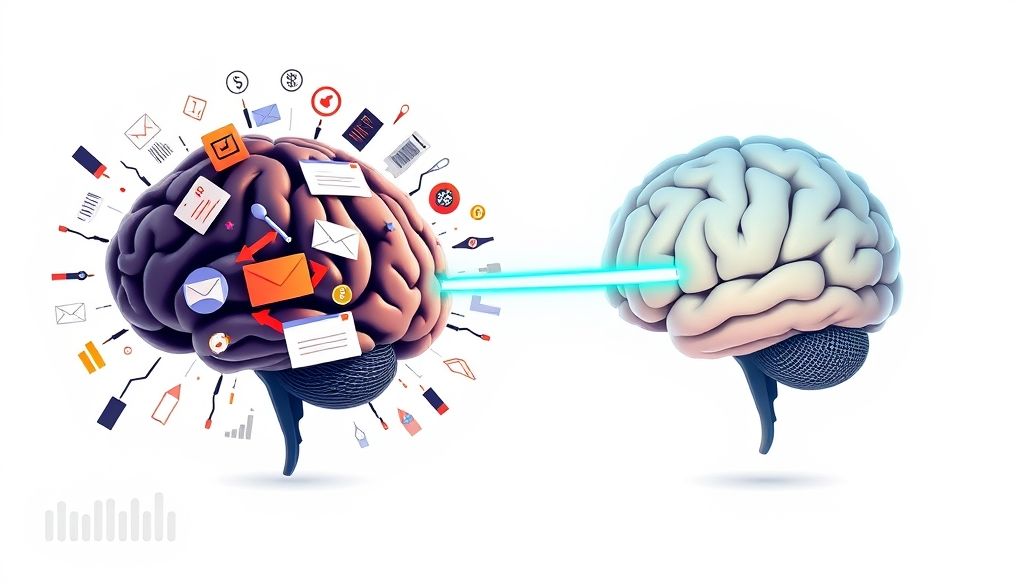Does Multitasking Destroy Your Productivity or Enhance It?
In today's fast-paced world, multitasking has become a highly sought-after skill. It's often seen as a way to boost productivity and get more done in less time. However, the question remains: is multitasking truly beneficial for our brains and productivity, or is it just an illusion?
What is Multitasking?
Simply put, multitasking is the attempt to perform two or more tasks simultaneously, or to switch between them rapidly. This can include writing an email while attending a meeting, talking on the phone while driving, or even browsing social media while watching television.
Types of Multitasking:
- Parallel Multitasking: Performing multiple tasks at the same time, such as listening to music while exercising.
- Serial Multitasking: Rapidly switching between tasks, focusing on one task at a time. This is the most common type of multitasking.
The Science Behind Multitasking: How the Brain Works
The human brain is not designed to handle multiple tasks simultaneously efficiently. When we try to multitask, we are actually rapidly switching our attention between different tasks. This process is called "Task Switching."
How Does Task Switching Affect the Brain?
Task switching has a significant cognitive cost. Each time we switch tasks, the brain needs to redirect its attention and update its working memory. This process takes time and energy, and can lead to:
- Increased Errors: When we switch tasks rapidly, we become more prone to making mistakes.
- Decreased Productivity: Tasks take longer to complete when multitasking compared to focusing on one task at a time.
- Increased Stress: Multitasking can lead to increased levels of stress and anxiety.
- Impaired Memory: Chronic multitasking can affect working memory and long-term memory.
Why Do We Think We Are Good at Multitasking?
Many people believe they are good at multitasking, but research shows that this is often an illusion. People who think they are good at multitasking are often the worst at it. This is because they tend to overestimate their ability to focus and ignore distractions.
The Illusion of Efficiency:
We believe we are accomplishing more when multitasking, but in reality, we are simply distributing our attention across multiple tasks. This can create an illusion of efficiency, where we feel like we are being productive, but we are actually accomplishing less and making more mistakes.
The Negative Effects of Multitasking on the Brain and Health:
In addition to affecting productivity, multitasking can have other negative effects on the brain and health:
- Reduced Ability to Focus: Chronic multitasking can lead to difficulty focusing on a single task for an extended period.
- Increased Distractibility: It can make us more susceptible to distractions and less able to ignore them.
- Changes in Brain Structure: Some studies suggest that chronic multitasking can lead to changes in brain structure, particularly in the areas of the brain responsible for attention and memory.
- Increased Risk of Depression and Anxiety: Multitasking can lead to increased levels of stress and anxiety, increasing the risk of depression and anxiety.
When is Multitasking Acceptable?
Not all multitasking is harmful. In some cases, multitasking can be beneficial, especially when it comes to simple and routine tasks that don't require much focus. For example, you can listen to music while washing dishes or folding laundry.
Conditions for Acceptable Multitasking:
- Tasks are Simple and Routine: The tasks should be easy and not require much focus or mental effort.
- Tasks Don't Compete for the Same Mental Resources: The tasks should be different and not require the same areas of the brain. For example, listening to music while exercising is acceptable, but reading while listening to a podcast may be difficult.
- Tasks Don't Require Much Attention: The tasks you are doing should be automatic and not require much conscious thought.
Healthy Alternatives to Multitasking:
Instead of trying to perform multiple tasks simultaneously, there are healthier alternatives that can help you increase productivity and reduce stress:
- Single-Tasking: Focusing on one task at a time and completing it before moving on to the next task.
- Pomodoro Technique: Working on a single task for 25 minutes, then taking a short break for 5 minutes. After four cycles, take a longer break for 20-30 minutes.
- Prioritization: Identifying the most important tasks and focusing on them first.
- Eliminating Distractions: Turning off notifications, closing unnecessary tabs, and reducing ambient noise.
- Planning and Scheduling: Allocating specific time for each task and sticking to the schedule.
Tips for Reducing Multitasking:
- Be Aware of Your Habits: Pay attention to when you tend to multitask and try to identify the underlying reasons for it.
- Set Boundaries: Set specific times to check email and social media and avoid doing it throughout the day.
- Create a Quiet Work Environment: Reduce distractions in your work environment as much as possible.
- Use Time Management Tools: There are many apps and tools that can help you track your time and prioritize tasks.
- Be Patient with Yourself: Changing habits takes time and effort. Don't get discouraged if you don't see immediate results.
Studies and Research on Multitasking:
Numerous studies have shown that multitasking has a negative impact on cognitive performance and productivity. For example, a study by Stanford University found that people who believe they are good at multitasking are actually the worst at it.
"People who are chronically multitasking perform worse and show greater difficulty filtering out irrelevant information – even when they are doing a single task." - Clifford Nass, Stanford University
Another study published in the Journal of Experimental Psychology showed that multitasking can temporarily reduce IQ by as much as 15 points.
Conclusion:
In conclusion, while multitasking may seem appealing in today's fast-paced world, it is often an illusion that leads to decreased productivity, increased stress, and impaired cognitive performance. It is better to focus on one task at a time and complete it before moving on to the next task. By adopting healthy habits for time management and focus, you can increase your productivity and improve your mental health.




